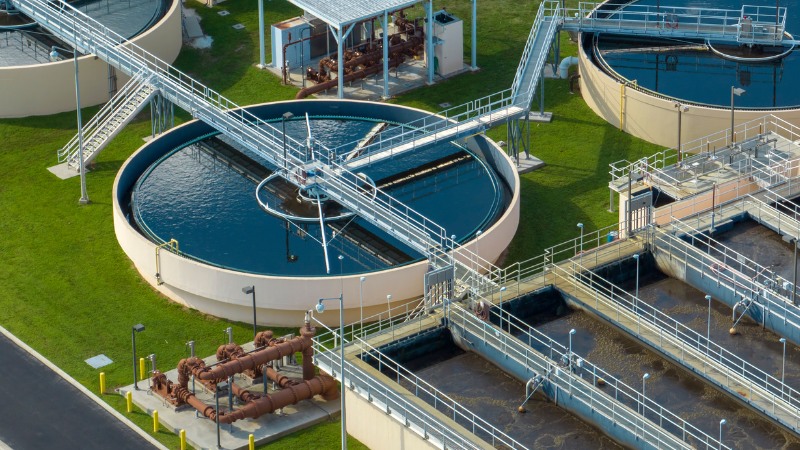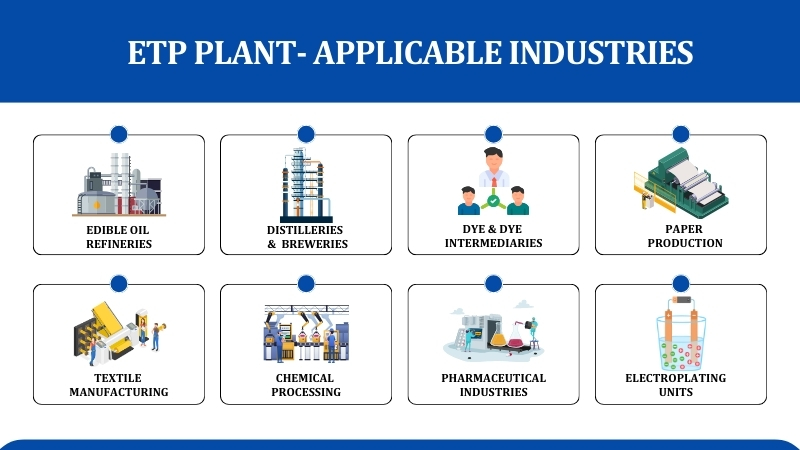MKS Industrial Solutions is one of the best ETP plant manufacturers in India and globally. We specialize in providing complete, customized solutions for Effluent Treatment Plants (ETP). These advanced systems are designed to remove toxic and non-toxic contaminants from industrial wastewater, making the water safe for reuse or discharge and promoting eco-friendly, sustainable practices.
What is an Effluent Treatment Plant (ETP)?
An effluent treatment plant (ETP) is a system designed to clean industrial wastewater. It removes harmful substances, such as toxic chemicals, solids, and biological pollutants, making the water safe for reuse or discharge into the environment.
Why is Wastewater Management Important?
Water is essential for life and many industrial processes. However, wastewater from industries often contains harmful pollutants that can damage the environment if not treated properly. ETPs solve this problem by cleaning the wastewater and ensuring it meets environmental standards before reusing or releasing it.
Industries such as pharmaceuticals, textiles, and chemicals use ETPs to reduce pollution and save water. These plants help them follow environmental rules and make better use of water resources.
Why ETPs Are Essential:
Industries pay significant taxes for raw water. Treating used water through an ETP ensures it meets regulatory standards, reduces operational costs, and supports sustainable water use practices.
 How Does the Effluent Treatment Plant Process Work?
How Does the Effluent Treatment Plant Process Work?
Effluent Treatment Plants (ETPs) are essential facilities designed for industrial wastewater treatment. They effectively remove harmful contaminants, ensuring that the treated water is safe for reuse or discharge into the environment. The treatment process involves several critical stages:
1. Preliminary Treatment:
- Screening: The first step in the treatment process, where large floating solids such as cloth, paper, and plastics are removed using screens.
- Sedimentation: Utilizes gravity to separate and remove suspended solids from the wastewater.
- Grit Chamber: Targets and eliminates dense inorganic solids like gravel, sand, and metal fragments to prevent damage to subsequent treatment units.
- Clarifiers: Operate continuously to remove solids deposited by sedimentation before the water moves to biological treatment.
2. Primary Treatment:
- Flocculation: Adds chemicals that cause destabilized particles to aggregate into larger flocs, making them easier to separate from the water.
- Coagulation: Involves the rapid addition of coagulants to encourage minute solid particles to clump together and settle out quickly.
- Neutralization: Adjusts the pH of the wastewater to a range of 6-9, which is optimal for various treatment processes.
- Primary Clarifiers: These tanks slow down the water flow, allowing heavy solids to settle at the bottom while removing floating solids and greases from the surface.
3. Secondary Treatment:
- Activated Sludge Process: Aerates the wastewater, fostering the growth of biological floc composed of bacteria that break down organic pollutants.
- Aerated Lagoons: Large ponds with artificial aeration to enhance biological oxidation and degradation of organic matter.
- Trickling Filters: Consist of beds of coarse media that support microbial growth, which degrades organic matter as the wastewater trickles over the media.
- Rotating Biological Contactor: Uses rotating disks with microbial films to remove pollutants as the wastewater passes over them.
4. Tertiary Treatment:
- Chemical Coagulation and Sedimentation: Enhances the removal of remaining solids and fine particles after primary and secondary treatment stages.
- Filtration: Involves passing clarified wastewater through filters to ensure high-quality water by removing any remaining suspended solids.
- Reverse Osmosis: A high-pressure process that forces water through a semi-permeable membrane, separating and retaining contaminants on one side while allowing clean water to pass through.
- UV Disinfection: Uses ultraviolet light to disinfect and kill any remaining pathogens without leaving residual disinfectants or producing harmful by-products.
By following these stages, Effluent Treatment Plants (ETPs) help industries such as pharmaceuticals, textiles, and chemicals meet stringent environmental standards. They optimize water usage, protect the environment, and support sustainable industrial practices.
Sources of Industrial Wastewater
Effluent characteristics depend on the industry. Here are common sources and their specific pollutants:
- Agricultural and Food Industry: Wastewater is biodegradable but high in Biochemical Oxygen Demand (BOD) and suspended solids. For example, vegetable washing generates particulate and dissolved organic matter.
- Pulp and Paper Industry: Effluents contain high levels of BOD, suspended solids, and sometimes harmful chemicals like dioxins and chloroform. Treatment methods: Biological treatment or advanced membrane technologies like ultrafiltration.
- Chemical Industry: Contaminants include feedstock materials, by-products, and particulates. Preferred treatment: Aerated lagoons for aerobic treatment.
- Steel and Iron Industry: Effluents contain ammonia, cyanide, and polycyclic aromatic hydrocarbons from reduction processes. Treatment needs: Specialized systems for gasification by-products.
- Power Plant: Wastewater may contain metals like lead, mercury, and nitrogen compounds. Requires robust treatment systems to mitigate heavy metal contamination.
ETP Applications Across Industries
Effluent Treatment Plants are essential in industries like:
- Chemical Processing
- Pharmaceutical Industries
- Textile Manufacturing
- Paper Production
- Electroplating Units
- Distilleries and Breweries
- Dye and Dye Intermediaries
- Edible Oil Refineries
- Tanneries
Key Features of MKS ETP Solutions
- Fully customized designs tailored to specific industrial needs.
- Operator-friendly systems with low maintenance requirements.
- Approved by the Pollution Control Board (PCB) for regulatory compliance.
- Compact design requiring minimal space.
- Technology to minimize operating costs and optimize performance.
Benefits of Effluent Treatment Plants
- Zero Liquid Discharge System: A completely integrated system ensuring no environmental harm.
- Marketable By-products: Generate reusable or sellable outputs.
- Condensate Water Use: Full utilization of treated water.
- Compact Design: Space-saving layouts.
- No Scaling Issues: Smooth operations without froth formation.
- Ease of Use: User-friendly systems for efficient operations.



